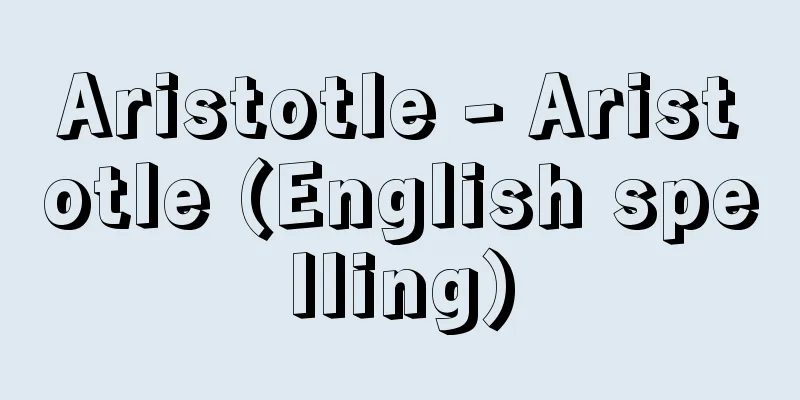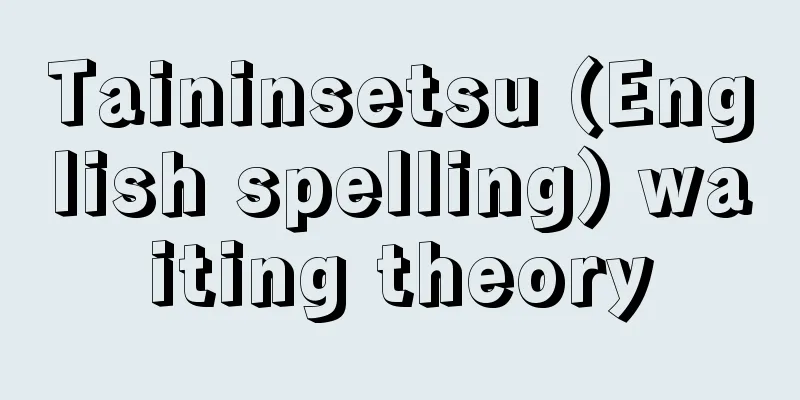Aristotle - Aristotle (English spelling)

|
A student of Plato, Aristotle is one of the greatest philosophers of ancient Greece, along with Plato. Whereas his teacher Plato valued the world of supersensible ideas, Aristotle valued things that are familiar to humans and took a realist stance, seeking to understand the causes that govern them. Deeply influenced by Plato's philosophy, Aristotle gradually built up his own system from the time he was in his prime. The relationship between the two philosophers' thoughts, especially the process of the formation of Aristotle's philosophy as a young man, remains a mystery even today due to limited sources (the mysteries of the early Academy), and is a subject of debate among specialist researchers. However, the greatest appeal of Greek philosophy lies in the tension that arises from the unique perspectives of the two philosophers regarding the same philosophy and the unique form of the development of their thoughts, which has long been the driving force behind the formation of European philosophy to this day. The characteristics of their thoughts are empiricism that starts from the given, fundamentalism that traces back to the ultimate ground, and comprehensiveness across all fields of knowledge. Aristotle gave philosophy a solid methodological foundation as an academic discipline, synthesizing the various elements of Greek philosophy up to that point and becoming the model for later philosophy as an academic discipline. [Nobuaki Kato] LifeHe was born in Stagira, a city in the northeast of the Chalkidiki Peninsula at the northern end of the Aegean Sea. His father was a physician and had close ties with the Macedonian royal family. At the age of 17, he went to Athens to study at Plato's academy, where he remained until his teacher's death. He then spent his time researching and teaching in Assos in Asia Minor and Mytilene on the island of Lesbos, and was invited by Macedonian King Philip II to teach the future Alexander the Great. In 335 BC, he returned to Athens and opened his own academy in Lyceum. After Alexander the Great's death in 323 BC, anti-Macedonian movements arose in Athens, and he was banished from Athens and fled to Chalcis in Euboea, the birthplace of his mother, where he died the following year in 322 BC. [Nobuaki Kato] Publications(1) During his stay at the Academy, he published Platonic dialogues and similar works for the general public, all of which are now lost. These include Eudemus, Exhortation to Philosophy, and On Philosophy. Fragments of these works have been collected since the 19th century as the Aristotelian Fragments. (2) Most of what has been passed down since ancient times as the Corpus Aristotelicum consists of lecture notes that Aristotle used when teaching at his school during his second stay in Athens. All of Aristotle's major works, such as the Organon, Physics, Metaphysics, On the Soul, Nicomachean Ethics, Politics, and Poetics, are included here. Some of these works are considered to have been written during his stay at the Academy or during his time at Assos shortly thereafter. Understanding how he developed his own ideas under the strong influence of Plato in these works is essential to understanding the reality of the "philosophy" that was formed between these two philosophers, and is one of the main interests of Aristotle studies today. (3) Another work that is considered to have been part of a collection of materials for basic research was discovered among papyrus excavated at the end of the 19th century. This is "The Constitution of the Athenians." [Nobuaki Kato] LogicAcademic knowledge is to recognize the necessary relationships between things through their causes. He established this procedure as the form of a syllogism, and by enumerating its various forms, he laid the foundation for later formal logic. He also devoted himself to the development of modal logic, but the significance of Aristotelian logic in this field has only recently begun to attract attention. He then analyzed the structure of demonstrative science, which is established by the application of syllogisms, and established axiomatic theories. Here, he first carried out his analysis using mathematics as a model, and then attempted to make this a methodology for demonstrative science in general that could also be applied to empirical science. Axioms are distinguished into inherent principles that are common to all demonstrative sciences (such as the law of the excluded middle) and principles that are unique to individual sciences (definitions, categorical propositions). The latter limit the types of subjects of individual sciences and posit their existence. Thus, demonstrative science is a procedure for demonstrating, by means of a syllogism, the phenomena that necessarily belong to a particular class of beings, which are predicated by definition, using a common principle. The inherent principle (definition, categorical proposition) is obtained by reason intuiting what is given in the given fact given to the senses. It is the first basis that defines a certain given fact as a "certain thing." [Nobuaki Kato] Natural ScienceThe study of the causes of sensible things that change and move is called natural science. He listed four types of causes (the theory of four causes): (1) material cause - the matter out of which a thing is made, (2) formal cause - the form into which a thing is fashioned, which defines the thing, (3) efficient cause - the force by which the thing is formed, and (4) final cause - the purpose for which the movement of the thing is formed. Of these, (2), (3), and (4) are one in natural things, so in the end, natural things come into being through matter and form, and the existence of nature is understood as a process of generation and development in which form realizes itself within matter. Matter is grasped there in accordance with its ultimate purpose as the ability to receive form (dunamis, potentiality), and the ultimate purpose (telos), entelecheia (perfection) and energeia (actuality), are considered to be the superior cause of natural existence (teleological view of nature). [Nobuaki Kato] metaphysicsIn contrast to particular science, which focuses on a portion of beings, the science that investigates the first causes of all existing things is called wisdom (sophia) or first philosophy (prote philosophia). While particular science asks about the necessary properties of a particular being insofar as it belongs to a particular class, it asks about the first principles or causes that make all existing things "exist" insofar as they are said to "exist." Thus, this science is the first and highest, as a universal science (ontology) that seeks the first principles that are the basis of the particular. But at the same time, it is also theology (theology) as the science that deals with the most noble being, God. Because God is the first being, he is also the cause of the existence of all things. God is the highest reality as a self-thinker (noesis, noetheos) that is separated from matter and remains in eternal and unchanging contemplation, and while he himself is unmoved, he is the "unmoved first mover" that moves all things as the "beloved". He is the ultimate purpose that transcends the natural world and is the basis of the natural world. Thus, the world is considered as a comprehensive whole consisting of the principles of oneness and many, and each thing realizes its own existence while at the same time being grounded and animated by God. The name Metaphysics comes from the position that this science occupied in later compilations of the Collected Works. [Nobuaki Kato] EthicsDistinguished from theoretical science, which is concerned with necessary existence, praxeology is established as knowledge of "how to do" related to "possible existence" (endechomenon) as "something that could be something else." Just as there are various good things, and there is knowledge of "how to do" (= technique, techne) that guides these actions, there is the highest good as the ultimate goal of actions. The highest good is the basis that ultimately limits various actions. Knowledge of what the highest good is and how to realize it is political science and ethics. The highest good is called "happiness" (eudaimonia) (happinessism), and happiness is said to be found in the activity (energeia) in which human abilities are fully exercised. Human abilities are the abilities of reason, and their full realization is in rational contemplation that imitates the activity of God's self-thinking, but this is only permitted to a few people for a time, and generally it is in the activity of realizing rational order in daily actions. The sustained state acquired within the soul as the power to always express human actions as "good" that conforms to the rational order is capacity (arete, virtue). Capacity is a tendency in the emotional part of the soul to not go to extremes but to remain in the middle, and it culminates in a tendency to justice that always realizes rational order in relationships with others. However, for this righteousness to be realized in each individual act, it is necessary to judge the rational order in each individual situation, which must involve the action of "prudence" (phronesis), which is the capacity of the rational part of the soul. When these two capacities, in inclination and in reason, are fully realized, the human capacity is perfected and love is realized in the human community. What is essentially being envisioned here is a community of philosophers who enjoy rational contemplation to the extent that humans are permitted to do so. [Nobuaki Kato] Political ScienceHuman beings are state animals (zoon politikon). Human good is realized in public life. Therefore, ethics is considered to be a part of political science. The theory of political system, which holds that the best possible constitution is one in which the middle class is at the center and the governed take turns governing, can be said to provide an excellent theory of moderate democracy. [Nobuaki Kato] PoeticsThe essence of creative writing is imitation (mimesis). Tragedy is the imitation of a noble act, the descent of a noble character into misfortune, and the purification of the emotions of pity and fear that it arouses in the spectator. [Nobuaki Kato] Aristotle the scientistAristotle's most voluminous works are those related to natural science, such as "Physics," "De Celestial Bodies," "De Generation and Degeneration," "De Meteorology," "Cosmology," "History of Animals," "De Parts of Animals," "De Movement of Animals," and "De Animalogenesis." The scope of his works ranges from the universal conditions of the material world and the structure of the universe to descriptions of individual animals and plants on Earth and their organs, covering almost the entirety of existence. He was not only a tireless observer of nature himself, but also collected and thoroughly examined the natural knowledge of his time, and tried to systematize it based on his own philosophical viewpoint, especially teleology. [Minoru Akima] About the movementHe also considers mechanical motion as a change in position or movement of place, as well as the growth of living things, in a teleological way. For example, when a piece of wood falls to the ground after being released from one's hand, he believes that in the air, this heavy object moves in accordance with its nature toward the place where it should originally be (toward the stationary Earth, the center of the universe). (A heavier object, such as a piece of iron, would fall faster than a piece of wood, because it would have a stronger tendency toward the center of the universe.) Conversely, in water, the same piece of wood, in accordance with its nature, moves upward toward the place where it should originally be (toward the moon). And in either case, the movement comes to an end sooner or later. He believed that the natural motion of terrestrial objects can only be a temporary rectilinear motion, falling or rising, whereas the heavenly bodies are in a constant circular motion, and that this is the natural motion according to their nature. He also believed that the heavenly bodies must be made of a fifth element, unlike the earth, which is made of four elements: earth, water, air, and fire. Thus, he divided the natural world into two parts, the "supraluminal" and the "sublunar". His division of motion into (1) natural and forced motion, and (2) terrestrial and celestial motion, greatly regulated subsequent thinking about the motion of matter and became a major obstacle in the development of mechanics. It was only when Galileo, Newton and others added new knowledge and removed this division that modern mechanics could be established. [Minoru Akima] Establishment of ZoologySince mathematics, astronomy, mechanics, and other sciences had already been developed to a certain extent before Aristotle, it cannot be said that he founded these sciences. However, the situation is different with zoology. Although Aristotle's work contains many strange and erroneous opinions and observations, such as the theory of spontaneous generation, Aristotle's achievement is immortal in that he was the first to logically organize and systematically organize the vast amount of individual knowledge in natural history, which had previously been largely unrelated, and established a science worthy of the name "zoology." In particular, his method of natural classification of animals is excellent and important. It is also worth noting that works such as "History of Animals" and "Parts of Animals" contain many descriptions of the physiology of the human body. What is particularly interesting is that he placed great importance on the role of the heart. The heart is the source of blood and the origin of body heat, which is essential for the survival of blood-bearing animals, and is also the seat of movement, sensation, emotion, and thought, that is, the seat of the mind. In accordance with this understanding, the roles of the lungs and brain were also defined. That is, he understood the lungs as an air-cooling device that prevents the body from overheating by breathing, and assigned the brain a secondary role of regulating the heat of the heart, denying or ignoring the relationship between the brain and sensations and other mental phenomena. [Minoru Akima] "The Complete Works of Aristotle", 17 volumes (1968-1973, Iwanami Shoten)" ▽ "An Introduction to Aristotle's Philosophy, by Izuru Takashi (1972, Iwanami Shoten)" ▽ "Aristotle's Philosophy, by D.J. Allan, translated by Yamamoto Mitsuo (1979, Ibunsha)" ▽ "The Field of Philosophy - Aristotle Speaks," by Inoue Tadashi (1980, Keiso Shobo)" ▽ "WD RossAristotle (1st ed. 1923, 3rd ed. Revised 1937, Methuen, London)" ▽ "J. Barnes, M. Schofield, R. Sorabji ed. Articles on Aristole, 4 vols (1975-1979, Duckworth, London)" ▽ "AO Rovty ed. Essays on Aristotle's Ethics (1980, University of California Press, Berkeley) [References] | | | | | | [Supplementary material] |Source: Shogakukan Encyclopedia Nipponica About Encyclopedia Nipponica Information | Legend |
|
プラトンの弟子で、プラトンと並ぶ古代ギリシア最大の哲学者。師プラトンが超感覚的なイデアの世界を重んじたのに対して、アリストテレスは人間に卑近な感覚される事物を重んじ、これを支配する諸原因の認識を求める現実主義の立場をとった。プラトンの哲学の深い影響から出発し、アリストテレスは壮年時からしだいに独自の体系を築き上げていった。両者の思索の関連、ことに若きアリストテレスの哲学形成の過程については、資料の制約もあって今日でも多くの謎(なぞ)を残し(初期アカデメイアの謎)、専門研究者間の論争の的になっている。しかし、同じ哲学をめぐる二人の哲学者のもった独自の視点とその思索の展開の固有な形態から生まれる緊張のうちにギリシア哲学のもつ最大の魅力はあり、その後長く今日に至るまでヨーロッパ哲学を形成する原動力となった。その思索の特徴は、所与から出発する経験主義、窮極根拠にまでさかのぼる根源性、知識の全部門にわたる総合性にある。アリストテレスによって哲学に学問としての確固とした方法的基礎が与えられ、これによってこれまでのギリシア哲学の諸要素は総合され、後代の学問としての哲学の範型となった。 [加藤信朗] 生涯エーゲ海の北端カルキディキ半島の北東の都市スタギラに生まれる。父は医師でマケドニア王家と親交があった。17歳のときアテネに出てプラトンの学園に入門し、師の没するまでとどまった。その後、小アジアのアッソス、レスボス島のミティレネでもっぱら研究と教授の生活を送り、マケドニア王フィリッポス2世に招かれて、後のアレクサンドロス大王の教育にあたった。紀元前335年ふたたびアテネに戻り、リケイオンに自分の学園を開いた。前323年アレクサンドロス大王が没して、アテネに反マケドニア運動が起こるに及んで、アテネから追放され、母親の生地エウボイアのカルキスに逃れて、翌前322年没した。 [加藤信朗] 著作(1)初め、アカデメイア滞在中、プラトン風の「対話編」、またはこれに準ずる一般向きの著作を公刊したが、今日ではこれらはすべて失われている。『エウデモス』『哲学の勧め』『哲学について』などがそれである。これらの著作の断片は、19世紀以来『アリストテレスの断片集』として収集されている。 (2)古来、『アリストテレス著作集』Corpus Aristotelicumとして伝えられるものの大部分は、第2期のアテネ滞在中に彼が自分の学園で教授する際に用いた講義のノートである。『オルガノン』『自然学』『形而上(けいじじょう)学』『霊魂論』『ニコマコス倫理学』『政治学』『詩学』など、アリストテレスの主著とみなされるものはすべてここに含まれる。なかにはアカデメイア滞在中、またはその直後のアッソス時代に執筆されたとみなされるものも含まれている。これらの著作において、彼がプラトンの強い影響下にどのように独自の思索を築いていったかを知るのは、この二人の哲学者の間に形成された「哲学」の現実を知るうえで肝要であり、今日のアリストテレス研究の主要な関心事の一つになっている。 (3)ほかに、基礎研究としての資料の集成の一部であったとみなされる著作が、19世紀末出土のパピルスのなかから発見されている。『アテネ人の国制』がそれである。 [加藤信朗] 論理学学問的な認識は、事物のもつ必然的な関連をその原因によって認識することにある。彼はその手続を三段論法(シュロギスモス)の形式として確立し、その諸形式を枚挙して、後の形式論理学の基礎を築いた。様相論理の開拓にも力を注いだが、この方面でのアリストテレス論理学の意義が注目され始めたのは最近のことである。ついで、三段論法の適用によって成り立つ論証科学の構造を分析し、公理論を確立した。ここで彼はまず数学を範型として分析を進め、さらにこれを経験科学にも適用しうる論証科学一般の方法論としようとした。公理は、すべての論証科学に共通の公理となる固有の原理(排中律など)と個別の科学に固有の原理(定義、定立命題)に区別される。後者は個別の科学の対象となる類を限定し、その存立を措定する。こうして、論証科学とは、定義によって措定される特定の類的存在について、共有の原理を用いて、この類に必然に内属する事象を三段論法を用いて論証してゆく手続である。固有の原理(定義、定立命題)は、感覚に与えられる所与事実の内に与えられているものを理性が直観することによって得られるとした。それは、一定の所与事実を「一定のもの」として限定している、第一の根拠なのである。 [加藤信朗] 自然学運動変化する感覚的事物の原因の研究が自然学といわれる。彼はここに4種の原因をあげた(四因論)。(1)質料因――事物が「それ」からできている素材、(2)形相因――事物が「それ」へと形づくられるもので、事物の定義となるもの、(3)始動因――「〈それに〉よって」事物が形成される因(もと)となる力、(4)目的因――この事物形成の運動が「それ」を目ざしてなされる目的、がそれである。このうち、(2)(3)(4)は自然物においては一つであるので、結局、質料と形相によって自然物はなり、質料の内に形相が自己を実現してゆく生成発展の過程として自然の存在は把握される。質料はそこで形相を受容しうる能力(デュナミス・可能態)として、終極目的に従って把握されるので、終極目的(テロス)であるエンテレケイア(完成態)、エネルゲイア(現実態)こそが、自然存在の優越する原因であるとされた(目的論的自然観)。 [加藤信朗] 形而上学存在者の一部を対象とする特殊学に対して、存在するすべての事物にとって第一の諸原因を考究する学問は知恵(ソフィアー)、または第一哲学(プローテー・フィロソフィアー)とよばれる。特殊学が特定の存在者について、それが特定の類に属する限りにおいて、必然にもつ諸性質を尋ねるのに対して、それは、存在するすべてのものについて、それらが「ある」といわれる限りにおいて、この「ある」を成り立たせている第一諸原理、諸原因を尋ねる。 こうして、この学問は、特殊なものの根拠にある第一の諸原理を探求する普遍学(存在学)として、第一の最高の学問である。だが、それは同時に、もっとも高貴な存在者、神を取り扱う学問として神学(テオロギケー)でもある。神は第一の存在者であることによって、すべてのものの存在の原因でもあるからである。神は質料から離れて、永遠不変な観照の内にとどまる自己思惟(しい)者(ノエーシス・ノエーセオース)として最高の現実態であり、それ自身は不動でありながら、「愛されるもの」としていっさいのものを動かす「不動の第一動者」である。それは、自然界を超える、自然界の根拠としての終極目的なのである。こうして、世界は一と多の原理からなる総合的全体として思索され、それぞれの事物がその固有の存在を実現しながら、同時に、神によって根拠づけられ、生かされるものとなった。メタフィシカ(形而上学)という名前は、この学問が後の全集編集において占めた位置に由来する。 [加藤信朗] 倫理学必然存在にかかわる理論学と区別され、「他でありうるもの」としての「可能存在」(エンデコメノン)にかかわる「どのように〈なす〉か」の知識として実践学が成立する。さまざまな善いものがあるところにそれを目的とするさまざまな行為があり、この行為を導く「どのようになすか」の知識(=技術・テクネー)があるように、行為が終極に目ざす目的として最高善がある。最高善はさまざまな行為を終極において限定する根拠である。最高善が何であり、それをいかにして実現するかの知識が政治学であり、倫理学である。 最高善は「幸福」(エウダイモニアー)とよばれ(幸福主義)、幸福は人間の能力が完全に発揮された活動(エネルゲイア)にあるとされる。人間の能力は理性の能力であり、その完全な実現は神の自己思惟の活動を模倣する理性的観照にあるが、これはわずかの人に一時だけ許されるにすぎず、一般には、日常の行動のうちに理性的秩序を実現する活動にある。人間の行動をいつも理性的秩序にかなった「よい」ものとして発現させるための力として、魂の内に獲得される持続的状態が器量(アレテー・徳)である。器量は魂の情動的な部分においては極端に走らず中間を保つ性向であり、それは他人に対する関係においていつも理性的秩序を実現する正義の性向のうちに終極する。だが、この正しさが個々の行為において実現されるためには、個別の状況における理性的秩序の判定を要し、それには魂の理性的部分の器量である「賢慮」(プロネーシス)の働きをまたねばならない。これら、性向におけると、理性におけると、二つの器量が備わるとき、人間の器量は完成され、人間の共同体のうちには愛が実現される。ここに実質上構想されているものは、人間に許される限りで理性的な観照を楽しむ哲学者の共同体であろう。 [加藤信朗] 政治学人間は国家的動物(ゾーオン・ポリティコン)である。公共の生活のうちに人間の善は実現される。それゆえ、倫理学は政治学の一部をなすと考えられている。中産階級を中心にして、治められるものが交代して治めるものとなるところに実現されうる最善の国制があるとした政体論は、穏健な民主主義の優れた理論づけを与えたものといえる。 [加藤信朗] 詩学創作の本質は、模倣(ミメーシス)にある。悲劇は崇高な行為の模倣であって、崇高な人物が不幸に陥っていく過程を模倣し、観客のうちに引き起こされる哀れみと恐れの情緒を用いて、こういう情緒を浄化することを本質とする。 [加藤信朗] 科学者アリストテレスアリストテレスの著述のうちでもっとも量が多いのは、自然科学にかかわる諸書である。すなわち、『自然学』『天体論』『生成消滅論』『気象論』『宇宙論』『動物誌』『動物部分論』『動物運動論』『動物発生論』などがある。その範囲は、物質界の普遍的諸条件や宇宙の構造などから、地球上の個々の動植物、その諸器官の記述などに至るまで、およそ存在するものの全体に及んでいる。彼は自ら飽きることのない自然観察家であったばかりでなく、その時代の自然知識を余すところなく収集し、詳しく検討して、自分の哲学的見地とりわけ目的論に基づいて体系化しようとした。 [秋間 実] 運動をめぐって生物の成長はむろんのこと、位置の変化、場所の移動としての力学的運動をも、彼はやはり目的論的に考察する。たとえば、手を離れた木片が地上へ落ちるのは、彼の考えでは、空気の中では、重いこの物体が自分の本性に従って、もともとそこにあるのが当然とされる場所を目ざして(宇宙の中心である静止した地球へ向けて)運動する、ということにほかならない(もっと重い物体たとえば鉄片は、宇宙の中心へ向かう傾向がもっと強いから、木片よりも速く落下するに違いない)。逆にこの木片は、水の中では、同じくその本性に従って、もともとそこにあるのが当然である場所を目ざし(月へ向けて)上昇運動を行う。そしてどの場合にも運動は、遅かれ早かれ終わりに達する。 地上の物体の自然的運動がこのように落下または上昇という一時的な直線運動でしかありえないのに対して、天体は永遠に一様な円運動を行っており、これがその本性にかなった自然的運動であると彼は考えた。さらに天体は、地球が土、水、気、火という四つの元素でできているのとは異なって、第五の元素でできているに違いない、とも考えた。こうして彼は、自然的世界を、互いに質を異にする二つの部分に、すなわち「月上界」と「月下界」とに分けたことになる。 彼が運動をこのように(1)自然的なものと強制的なもの、(2)地上のものと天上のものに区分したことは、彼以降の物質の運動についての考え方を大きく規定し、力学の発展という点では大きな障害となった。ガリレイ、ニュートンらによって新たな知見が加えられ、この区分が除去されたとき、初めて近世力学の樹立が可能になったのである。 [秋間 実] 動物学の樹立数学、天文学、力学などについてはアリストテレス以前に一定の発展があったから、こうした科学を彼が創始したということはできない。ところが動物学については事情が異なっている。自然発生説その他、今日からみれば奇妙な誤った意見や観察をいくつも含んでいるとはいえ、それまでまだほとんどつながりのなかった博物学上の膨大な個別の知見を初めて論理的に整え、体系的にまとめあげて「動物学」の名に値する学問を樹立したという点で、アリストテレスの功績は不朽である。とりわけその動物の自然分類法は優れており、重要なものである。 さらには、とりわけ『動物誌』や『動物部分論』などに人体の生理に関する記述がはなはだ多く含まれていることも、注目に値しよう。そのなかでとくに興味深いのは、彼が心臓の役割をきわめて重くみたということである。心臓は、血液の源泉であり、有血動物が生存するのに欠かせない体熱の起源であり、また、運動と感覚のはじめ、感情・思考の場、つまり心の座であるという。こうした認識に見合って、肺臓および脳の役目も規定されることになる。すなわち、彼は、肺臓を呼吸によって生体の過熱を防ぐ空冷装置と解したし、脳には心臓の熱を調節するという副次的役割をふりあてて、脳と感覚その他の精神現象とのかかわりは否定ないし無視したのである。 [秋間 実] 『『アリストテレス全集』全17巻(1968~1973・岩波書店)』▽『出隆著『アリストテレス哲学入門』(1972・岩波書店)』▽『D・J・アラン著、山本光雄訳『アリストテレスの哲学』(1979・以文社)』▽『井上忠著『哲学の現場――アリストテレスよ語れ』(1980・勁草書房)』▽『W. D. RossAristotle (1st ed. 1923, 3rd ed. Revised 1937, Methuen, London)』▽『J. Barnes, M. Schofield, R. Sorabji ed.Articles on Aristole, 4 vols(1975~1979,Duckworth, London)』▽『A. O. Rovty ed.Essays on Aristotle's Ethics(1980,University of California Press, Berkeley)』 [参照項目] | | | | | | [補完資料] |出典 小学館 日本大百科全書(ニッポニカ)日本大百科全書(ニッポニカ)について 情報 | 凡例 |
>>: Aristogeitōn (English spelling)
Recommend
Plutarch - Plutarchos
The greatest ancient Greek biographer and essayis...
Hanging Place - Kakeba
...The method was a credit system in which a pedd...
Hydrotherapy - Suijiryoho (English spelling)
A type of physical therapy that uses water. It is...
Limax marginatus (English spelling) Limax marginatus
…[Tadashige Nabe]. . … *Some of the terminology t...
Kiyaza
…In the Middle Ages, a group of merchants engaged...
Okushima (textiles) - Okujima
...The "tang" in "tozan" refe...
Yuki Tsumugi
A traditional silk fabric produced in the area al...
Kievskaya Rus'
The Kievan Rus' was the political, economic an...
Co-insurance - Kyodo Hoken
An insurance contract method in which multiple in...
Kimyochourai - A tribute to the deceased
To take refuge in a Buddha or Bodhisattva. Taking...
Celtae
…one of the ethnic groups that make up the histor...
Yen-denominated - Endate
1. Foreign exchange rate. The exchange rate betwee...
Myotis silgorensis (English spelling) Myotis silgorensis
…[Yoshiyuki Mizuko]. . . *Some of the terminology...
Arturo Benedetti Michelangeli
1920‐95 Italian pianist. Graduated from the Milan ...
Pedestrian crossing - Oudan Hodoukyo
...A bridge for pedestrians to pass over. Some ro...









